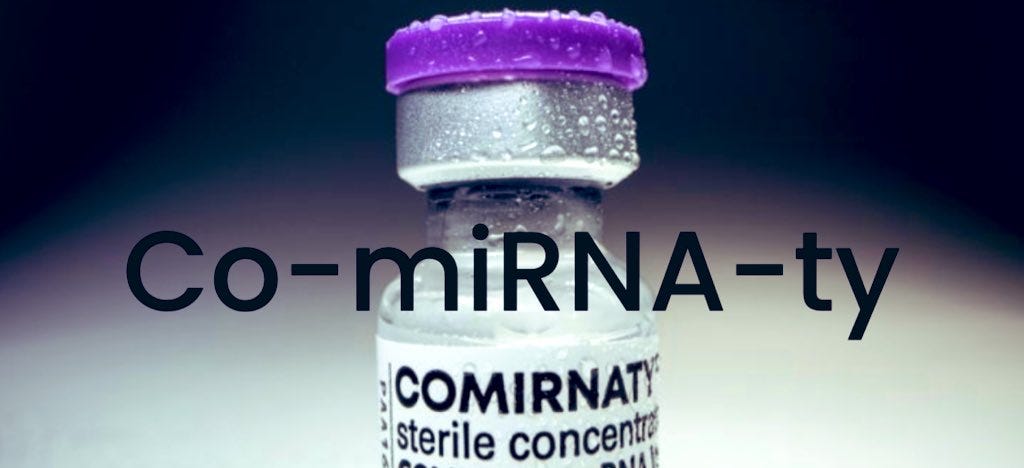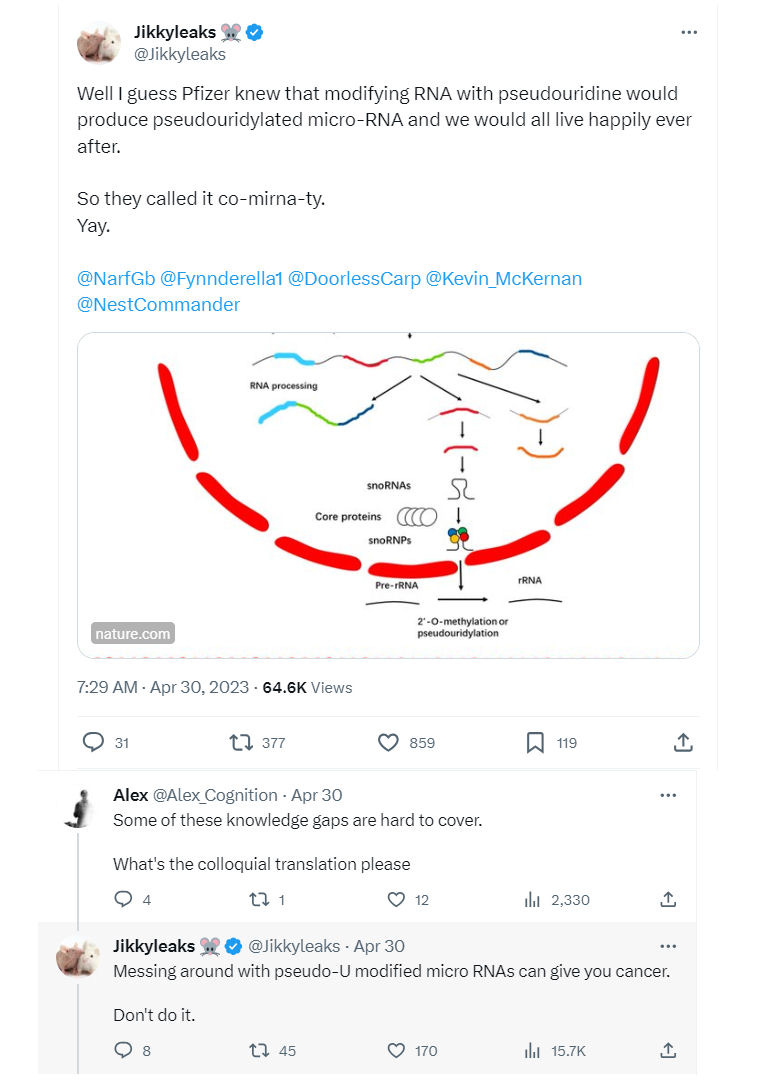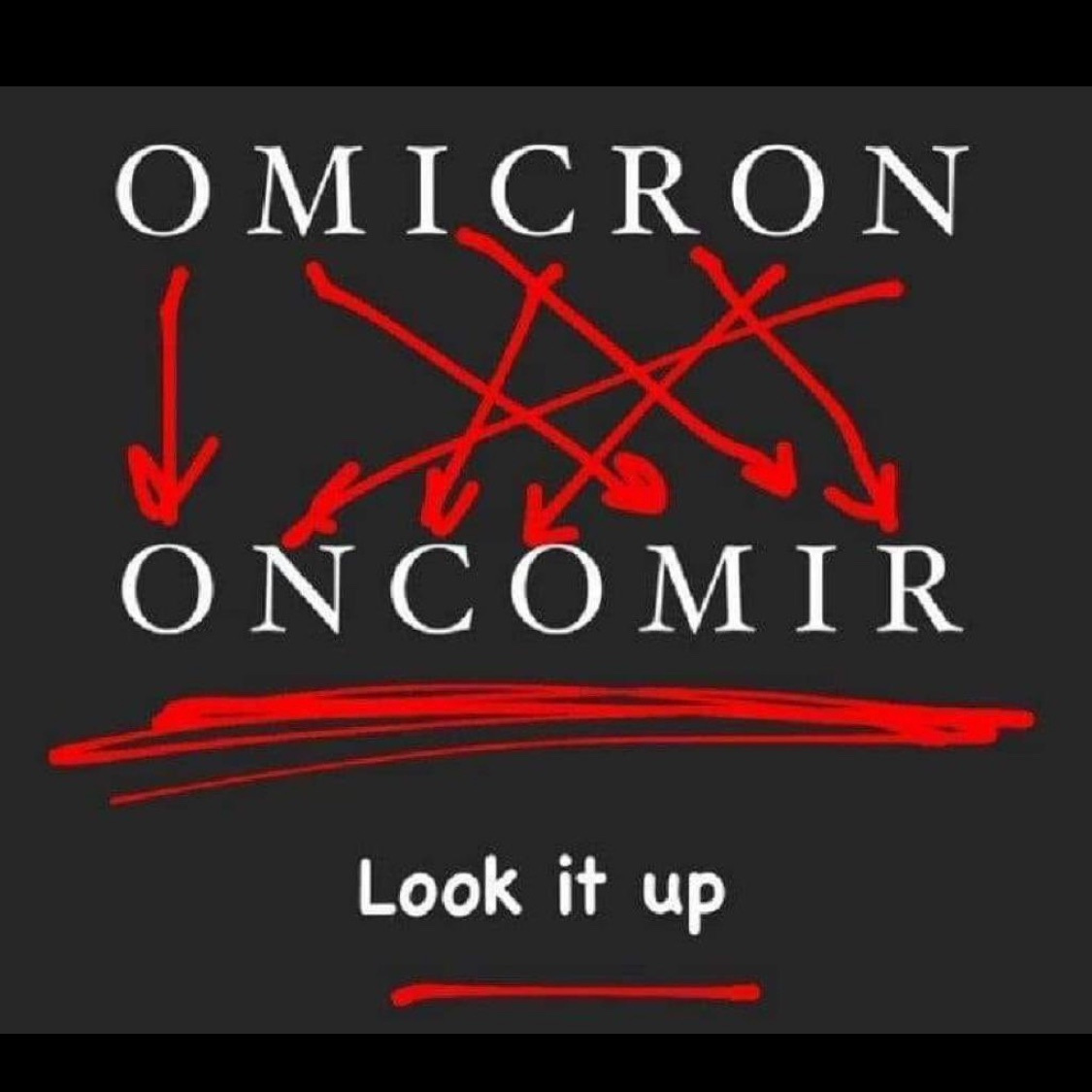Possible Treatment for COVID-19 mRNA Vaccine Turbo Cancer? Melatonin Regulates Oncogenic Micro RNAs or miRNA or Oncomir. Can It Counteract Pfizer’s Co-miRNA-ty Vaccine?
8 papers reviewed

All Global Research articles can be read in 51 languages by activating the Translate Website button below the author’s name.
To receive Global Research’s Daily Newsletter (selected articles), click here.
Click the share button above to email/forward this article to your friends and colleagues. Follow us on Instagram and Twitter and subscribe to our Telegram Channel. Feel free to repost and share widely Global Research articles.
***
Papers reviewed:
- 2023 Sep – Putta et al – Melatonin: Avenues in cancer therapy and its nanotechnological advancements
- 2023 Jun – Megerian et al – Melatonin and Prostate Cancer: Anti-tumor Roles and Therapeutic Application
- 2022 Sep – Davoodvandi et al – Melatonin and cancer suppression: insights into its effects on DNA methylation
- 2022 Aug – Florido et al – Understanding the Mechanism of Action of Melatonin, Which Induces ROS Production in Cancer Cells
- 2022 May – Monayo et al – The Prospective Application of Melatonin in Treating Epigenetic Dysfunctional Diseases
- 2022 Mar – Leilei Wang et al – Use of Melatonin in Cancer Treatment: Where Are We?
- 2021 Jul – Gonzalez et al – Melatonin as an Adjuvant to Antiangiogenic Cancer Treatments
- 2021 Apr – Talib et al – Melatonin in Cancer Treatment: Current Knowledge and Future Opportunities
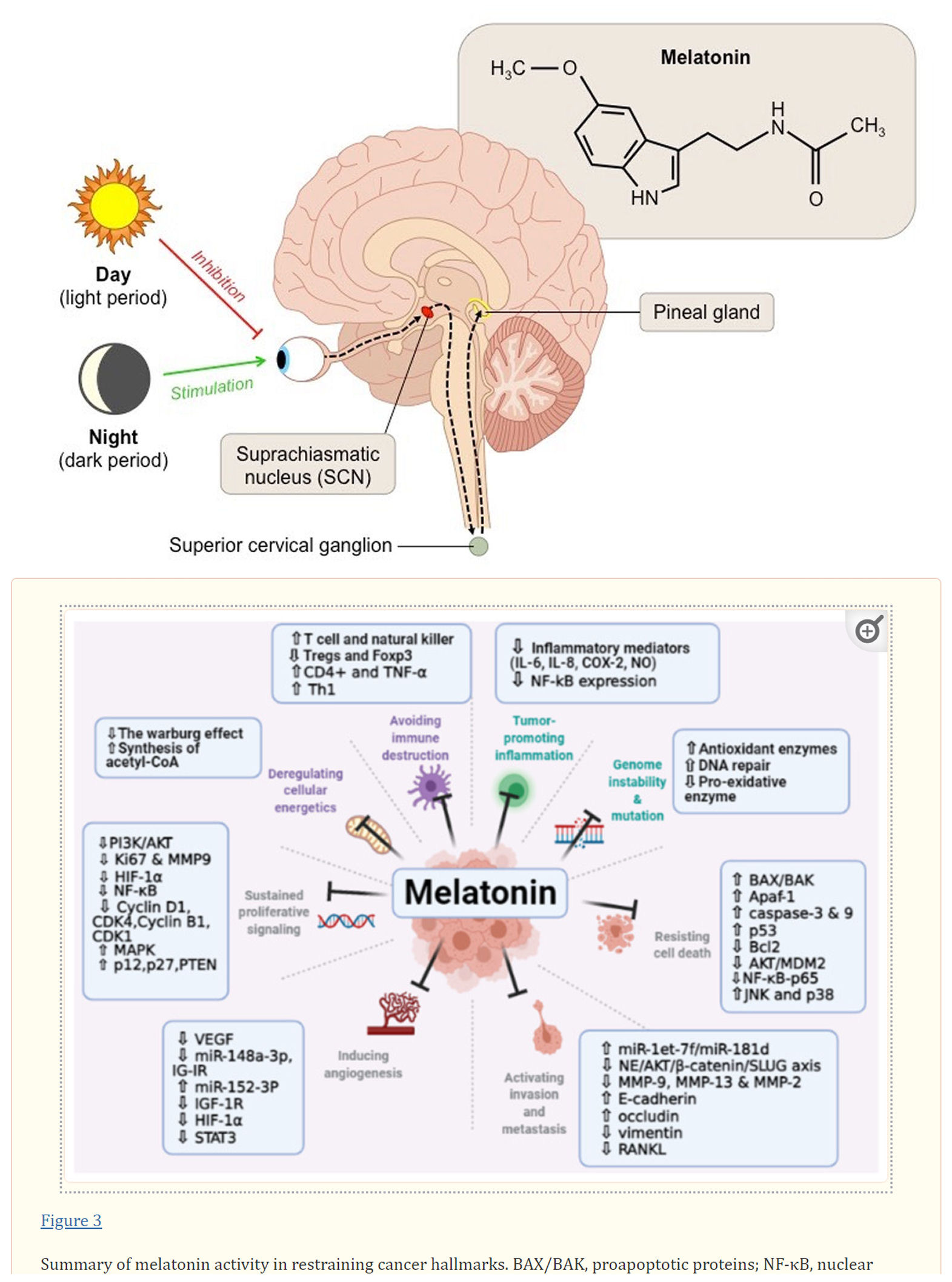
Image Source: (2021 Apr – Talib et al)
Non-coding RNA (microRNAs):
Artificial Light:
Problems with Using Melatonin as an Anti-cancer Drug
Safety and Dosing
Melatonin Effects on Cancer Cells
Melatonin Can Treat These Cancers:
Melatonin as Adjuvant Treatment to Chemo and Radiation
Melatonin Safety Profile and Dosing
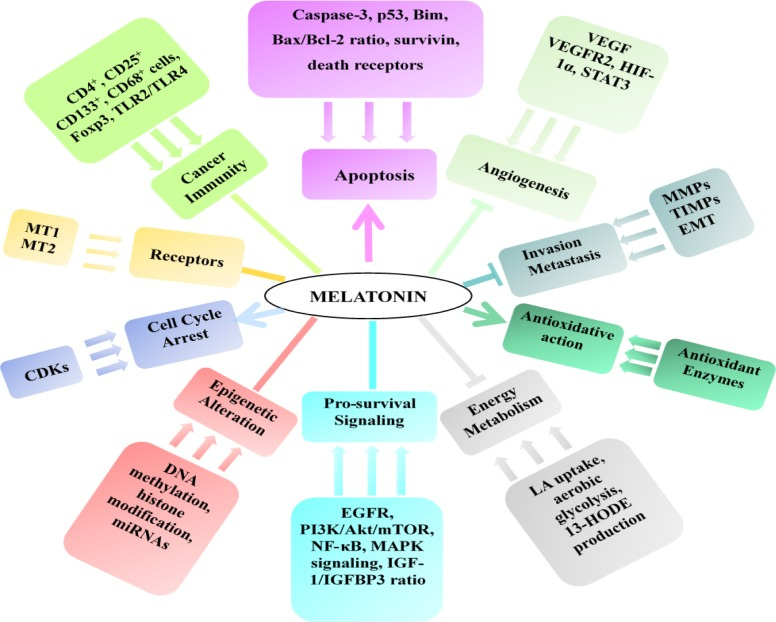
Source: 2017 – Ya Li et al – Melatonin for the prevention and treatment of Cancer)
My Take…
I have recently covered high dose Ivermectin and Fenbendazole for the possible treatment of very aggressive COVID-19 mRNA Vaccine Turbo Cancers, as these patients are not being given any options by their Oncologists and Turbo Cancers are resistant to conventional chemo and radiation.
Melatonin has extensive anti-cancer properties.
Oncogenic miRNAs or ONCOMIRS are overexpressed in a variety of cancer types and act through a variety of downstream targets. Multiple oncomirs are consistently overexpressed in a variety of cancer types such as miR-21, miR-31, miR-135, miR-155, and miR-17-92 family of oncomirs.
These act in a variety of manners to downregulate tumor suppressor pathways, upregulate oncogenic pathways, and even alter epigenetic machinery.
In other words: THEY PROMOTE CANCER.
What to do with Melatonin?
So Melatonin has been proven to regulate oncogenic miRNAs in a number of cancers, but can it regulate Pfizer’s or Co-miRNA-ty’s oncogenic miRNAs?
MAYBE. No one has asked. Well, I’m asking but I don’t know the answer.
Melatonin has been shown to treat breast, colon, lung, hepatobiliary, ovarian and prostate cancers – which just happen to also be the same cancers that show up after Pfizer or Moderna COVID-19 mRNA Vaccination but in Stage 4 Turbo Variety!
For Cancer treatment the dosing starts at a minimum of 20mg / day but all the studies admit that the dose must be much higher. But how high?
Some people are taking 60mg to 720mg per day, presumably safely:
- see article by William Faloon – A Case for Higher Dose Melatonin
- Integrative Medicine Center of Western Colorado uses 180mg to 720mg per day
*
Note to readers: Please click the share button above. Follow us on Instagram and Twitter and subscribe to our Telegram Channel. Feel free to repost and share widely Global Research articles.
Dr. William Makis is a Canadian physician with expertise in Radiology, Oncology and Immunology. Governor General’s Medal, University of Toronto Scholar. Author of 100+ peer-reviewed medical publications.
Featured image is from Children’s Health Defense
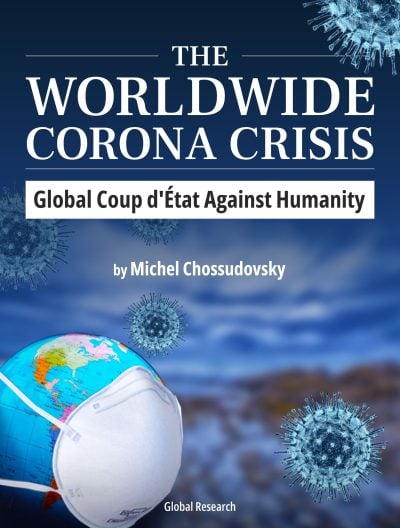 The Worldwide Corona Crisis, Global Coup d’Etat Against Humanity
The Worldwide Corona Crisis, Global Coup d’Etat Against Humanity
by Michel Chossudovsky
Michel Chossudovsky reviews in detail how this insidious project “destroys people’s lives”. He provides a comprehensive analysis of everything you need to know about the “pandemic” — from the medical dimensions to the economic and social repercussions, political underpinnings, and mental and psychological impacts.
“My objective as an author is to inform people worldwide and refute the official narrative which has been used as a justification to destabilize the economic and social fabric of entire countries, followed by the imposition of the “deadly” COVID-19 “vaccine”. This crisis affects humanity in its entirety: almost 8 billion people. We stand in solidarity with our fellow human beings and our children worldwide. Truth is a powerful instrument.”
Reviews
This is an in-depth resource of great interest if it is the wider perspective you are motivated to understand a little better, the author is very knowledgeable about geopolitics and this comes out in the way Covid is contextualized. —Dr. Mike Yeadon
In this war against humanity in which we find ourselves, in this singular, irregular and massive assault against liberty and the goodness of people, Chossudovsky’s book is a rock upon which to sustain our fight. –Dr. Emanuel Garcia
In fifteen concise science-based chapters, Michel traces the false covid pandemic, explaining how a PCR test, producing up to 97% proven false positives, combined with a relentless 24/7 fear campaign, was able to create a worldwide panic-laden “plandemic”; that this plandemic would never have been possible without the infamous DNA-modifying Polymerase Chain Reaction test – which to this day is being pushed on a majority of innocent people who have no clue. His conclusions are evidenced by renown scientists. —Peter Koenig
Professor Chossudovsky exposes the truth that “there is no causal relationship between the virus and economic variables.” In other words, it was not COVID-19 but, rather, the deliberate implementation of the illogical, scientifically baseless lockdowns that caused the shutdown of the global economy. –David Skripac
A reading of Chossudovsky’s book provides a comprehensive lesson in how there is a global coup d’état under way called “The Great Reset” that if not resisted and defeated by freedom loving people everywhere will result in a dystopian future not yet imagined. Pass on this free gift from Professor Chossudovsky before it’s too late. You will not find so much valuable information and analysis in one place. –Edward Curtin
ISBN: 978-0-9879389-3-0, Year: 2022, PDF Ebook, Pages: 164, 15 Chapters
Price: $11.50 FREE COPY! Click here (docsend) and download.
We encourage you to support the eBook project by making a donation through Global Research’s DonorBox “Worldwide Corona Crisis” Campaign Page.


